Psychological Safety Resource List
“...leadership is exercised by people throughout the organization, not just at the top, and especially by those at the front lines where crucial work affecting customer experience is carried out. This kind of leadership is about developing others’ skills and shaping effective processes…Those in the thick of collaborative activity help ensure that teaming occurs effectively. Sometimes these leaders have formal responsibility for a project or a department; at other times, they’re simply the ones who see an opportunity to lead and act upon it. With teaming, the concept of leadership then becomes an activity that takes place both at the top ranks of the organization and at the front lines of operations.” - Amy C. Edmondson
Suggested Articles
- Psychological Safety Survey: Do You Feel Psychologically Safe at Work? by Sandra Donati (2022)
- What Is Psychological Safety? by Amy Gallo (2023)
- Psychological Safety Unlocks the Potential of Diverse Teams by Henrik Bresman and Amy C. Edmondson (2022)
- How Psychological Safety Affects Team Performance: Mediating Role of Efficacy and Learning Behavior by Sehoon Kim, Heesu Lee, and Timothy Paul Connerton (2020)
- 14 Ways You Can Improve Psychological Safety At Work by Forbes Coaches Council (2017)
Suggested Books
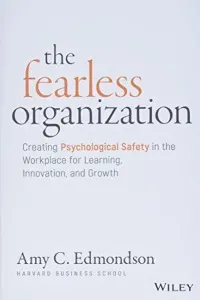
The Fearless Organization: Creating Psychological Safety in the Workplace for Learning, Innovation, and Growth by Amy C. Edmonson (2018)
"...a step-by-step framework for establishing psychological safety within a team and an organization. It is filled with illustrative scenario-based examples and provides a clear path forward for implementing a culture that thrives on the free expression of ideas and nurturing engagement."
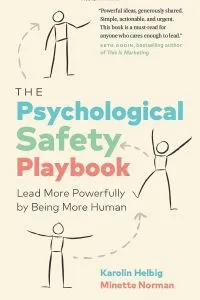
The Psychological Safety Playbook: Lead More Powerfully by Being More Human by Karolin Helbig and Minette Norman (2023)
"The Psychological Safety Playbook invites you to explore twenty-five specific actions that will create more psychological safety in your workplace. These are all moves that every leader can adopt and practice. Each move features a description of why to try it, instructions on how to do it, and a nutshell summary. You can start anywhere in the playbook—all the plays and moves are self-contained!"
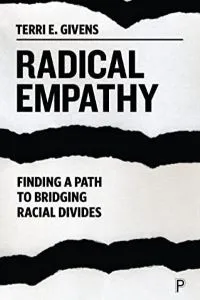
Radical Empathy: Finding a Path to Bridging Racial Divides by Terri E. Givens (2021)
"Terri Givens calls for ‘radical empathy’ - moving beyond an understanding of others’ lives and pain to understand the origins of our biases, including internalized oppression. Deftly weaving together her own experiences with the political, she offers practical steps to call out racism and bring about radical social change."

Mindset: The New Psychology of Success by Carol S. Dweck (2017)
Dweck "...shows how success in school, work, sports, the arts, and almost every area of human endeavor can be dramatically influenced by how we think about our talents and abilities. People with a fixed mindset—those who believe that abilities are fixed—are less likely to flourish than those with a growth mindset—those who believe that abilities can be developed. Mindset reveals how great parents, teachers, managers, and athletes can put this idea to use to foster outstanding accomplishment."
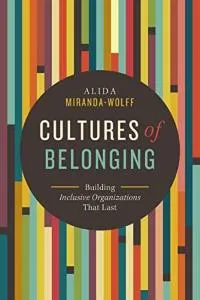
Cultures of Belonging: Building Inclusive Organizations That Last by Alida Miranda-Wolff (2022)
"Clear, actionable steps for you to build new values, experiences, and perspectives into your organizational culture, infusing it with the diversity, inclusion, and belonging employees need to feel accepted, be their best selves, and do their best work."
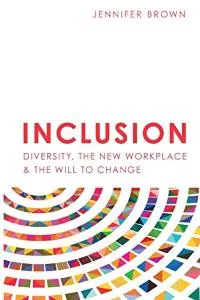
Inclusion: Diversity, the New Workplace and the Will to Change by Jennifer Brown (2016)
"Talent who feel fully welcomed, valued, respected, and heard by their colleagues and their organizations will fuel this growth. We will only succeed in this transformation if those in leadership pivot from command and control management styles to reinvent how we look at people, every organization's greatest asset. It's also critical that we build systems that embrace diversity in all its forms, from identity and background to diversity of thought, style, approach, and experience, tying it directly to the bottom line."
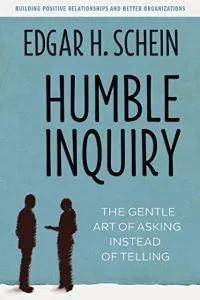
Humble Inquiry: the Gentle Art of Asking Instead of Telling by Edgar H Schein (2013)
"The fine art of drawing someone out, of asking questions to which you do not know the answer, of building a relationship based on curiosity and interest in the other person.' In this seminal work [Schein] explores the concept of humility, looks at how Humble Inquiry differs from other kinds of inquiry, offers examples of Humble Inquiry in action in many different settings, and shows how to overcome the cultural, organizational and psychological barriers that keep us from practicing it."
Suggested Videos
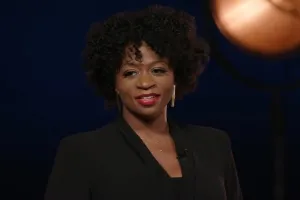
The Myth of Bringing Your Full, Authentic Self to Work by Jodi-Ann Burey (2021)
"Calls for authenticity at work ask for passionate people with diverse, fresh perspectives who challenge old ways of thinking. But too often workplace culture fails to support the authenticity of professionals of color and other underrepresented groups, leading instead to backlash and fewer opportunities. Writer Jodi-Ann Burey outlines steps toward exposing privilege and achieving true equity on the job -- and implores those in leadership positions to accept responsibility for change."

What is Psychological Safety: Intro to The 4 Stages of Psychological Safety by Timothy R. Clark (2020)
"Psychological safety is a condition in which human beings feel (1) included, (2) safe to learn, (3) safe to contribute, and (4) safe to challenge the status quo – all without fear of being embarrassed, marginalized, or punished in some way. The 4 Stages of Psychological Safety is a universal pattern that reflects the natural progression of human needs in social settings. When teams, organizations, and social units of all kinds progress through the four stages, they create deeply inclusive environments, accelerate learning, increase contribution, and stimulate innovation."
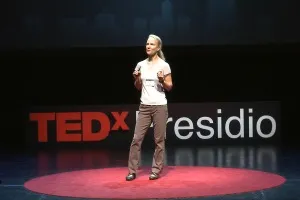
Creating Ethical Cultures in Business by Brooke Deterline (2012)
As Corporate Director for the Heroic Imagination Project (HIP), Brooke helps boards, executives, and teams at all levels develop the skills to act with courage and ingenuity in the face of challenging situations. This fosters leadership credibility and candor, builds trust, engagement and reduces risk.